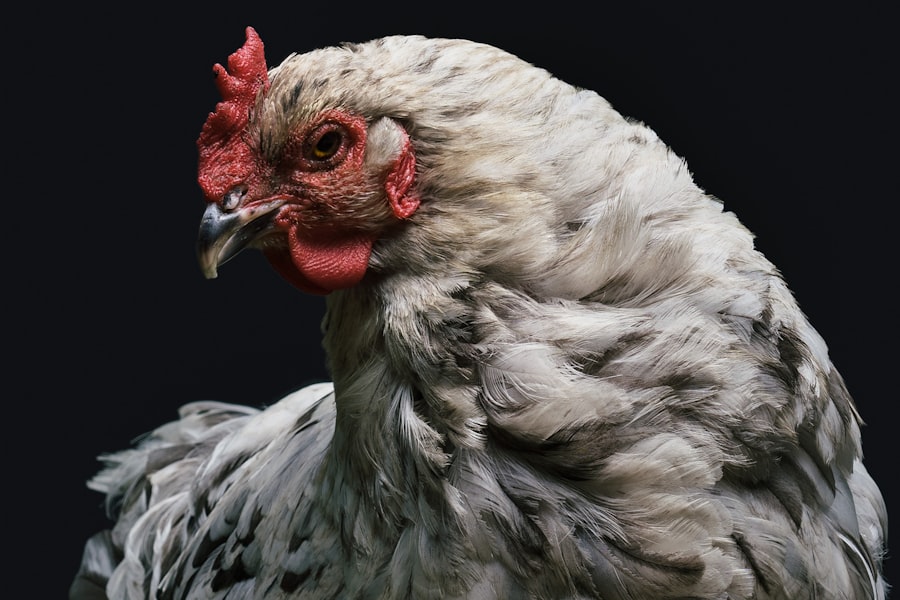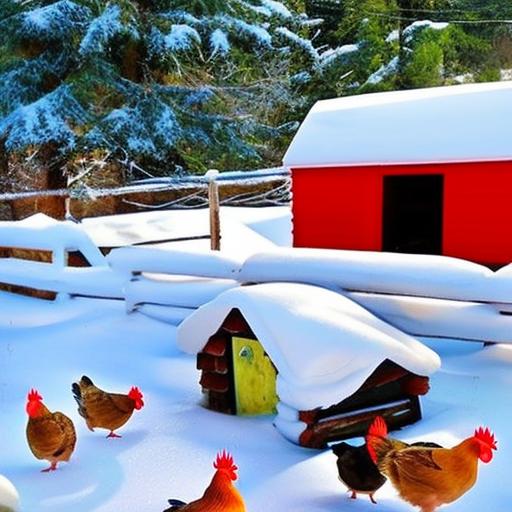Keeping chickens warm in winter is crucial for their health and well-being. Chickens are sensitive to cold temperatures and can suffer from a variety of negative effects if not properly protected. Cold weather can lead to frostbite, respiratory issues, decreased egg production, and even death. Therefore, it is essential for chicken owners to take the necessary steps to keep their feathered friends warm during the winter months.
Key Takeaways
- Keeping chickens warm in winter is important for their health and comfort.
- Insulating the chicken coop and providing proper ventilation are key to keeping chickens warm.
- Choosing the right bedding material and providing adequate lighting and water are also important.
- Providing adequate nutrition and choosing the right heat source for the coop are crucial in winter.
- Regular monitoring of the chickens’ health and comfort is necessary to ensure their well-being.
Insulating the Chicken Coop: Tips and Tricks
Insulating the chicken coop is one of the most effective ways to keep chickens warm in winter. Insulation helps to retain heat and prevent drafts, creating a cozy environment for the chickens. There are several tips and tricks that can help chicken owners insulate their coop effectively.
Firstly, it is important to seal any gaps or cracks in the coop walls and windows. This can be done using caulk or weatherstripping. Additionally, adding insulation material such as foam boards or fiberglass insulation between the walls can help to further insulate the coop.
Another tip is to insulate the floor of the coop. This can be done by adding a layer of straw or wood shavings, which will provide an extra layer of insulation and warmth for the chickens.
Lastly, it is important to insulate the roof of the coop. This can be done by adding a layer of insulation material such as foam boards or reflective insulation. This will help to prevent heat loss through the roof and keep the chickens warm.
Ventilation: Maintaining a Healthy Environment for Your Chickens
While insulation is important for keeping chickens warm, proper ventilation is equally crucial for maintaining a healthy environment in the chicken coop. Good ventilation helps to remove moisture, ammonia, and other harmful gases from the coop, which can build up and cause respiratory issues for the chickens.
To maintain proper ventilation in the chicken coop, it is important to have both intake and exhaust vents. Intake vents should be located near the floor to allow fresh air to enter the coop, while exhaust vents should be located near the ceiling to allow stale air to escape.
It is also important to ensure that the vents are not blocked by insulation or other materials. Regularly check the vents to make sure they are clear and functioning properly.
Proper ventilation has several benefits for chickens. It helps to prevent respiratory issues, reduce the risk of frostbite, and maintain good air quality in the coop. Therefore, it is essential for chicken owners to prioritize ventilation in their coop during the winter months.
Bedding: Choosing the Right Material to Keep Chickens Warm
Bedding plays a crucial role in keeping chickens warm during winter. It provides insulation and helps to retain heat in the coop. Choosing the right bedding material is important to ensure the comfort and well-being of the chickens.
When choosing bedding material, it is important to consider its insulating properties, absorbency, and ease of cleaning. Some popular bedding materials for chickens include straw, wood shavings, and shredded paper.
Straw is a common choice for chicken bedding as it provides good insulation and absorbs moisture well. However, it can be difficult to clean and may harbor mites or other pests.
Wood shavings are another popular option as they are highly absorbent and provide good insulation. They are also easy to clean and can help control odors in the coop.
Shredded paper is a more environmentally friendly option for chicken bedding. It is easy to clean and provides some insulation. However, it may not be as absorbent as other materials.
It is important to regularly clean and replace the bedding in the coop to maintain a clean and healthy environment for the chickens.
Lighting: Supplementing Natural Light to Keep Chickens Active and Warm
Lighting plays an important role in keeping chickens warm during winter. Chickens require a certain amount of light to stay active and maintain their body temperature. Supplementing natural light in the chicken coop can help to ensure that the chickens receive adequate light and stay warm.
One way to supplement natural light is by using artificial lighting in the coop. This can be done by installing light fixtures with timers or using battery-operated LED lights. The lights should be set to turn on early in the morning and turn off in the evening to mimic natural daylight hours.
Another option is to use reflective surfaces in the coop to maximize the amount of natural light. This can be done by painting the walls and ceiling with light-colored paint or adding mirrors or reflective panels.
Proper lighting has several benefits for chickens. It helps to regulate their body temperature, maintain egg production, and prevent behavioral issues such as feather picking or aggression.
Water: Preventing Freezing to Keep Chickens Hydrated

Water is essential for keeping chickens hydrated, especially during winter when they may not have access to natural water sources. However, water can easily freeze in cold temperatures, making it difficult for chickens to drink.
To prevent water from freezing in winter, there are several options available. One option is to use heated waterers or heated bases for waterers. These devices are designed to keep the water at a constant temperature and prevent it from freezing.
Another option is to use insulated waterers or wrap regular waterers with insulation material such as foam or bubble wrap. This helps to retain heat and prevent freezing.
It is important to regularly check the waterers and ensure that they are functioning properly. If the water does freeze, it should be replaced with fresh, unfrozen water as soon as possible.
Food: Providing Adequate Nutrition to Help Chickens Stay Warm
Providing adequate nutrition is crucial for helping chickens stay warm during winter. Cold temperatures increase the energy requirements of chickens, and they need a balanced diet to meet their nutritional needs.
During winter, it is important to provide chickens with a high-quality feed that is specifically formulated for their needs. This feed should contain a balance of protein, carbohydrates, fats, vitamins, and minerals.
Additionally, it is important to provide chickens with extra treats and supplements to help them stay warm. These can include scratch grains, cracked corn, mealworms, and high-energy treats such as suet or black oil sunflower seeds.
It is also important to ensure that chickens have access to fresh water at all times. Dehydration can increase the risk of cold stress in chickens.
Heat Sources: Choosing the Right Heating Option for Your Chicken Coop
In some cases, providing additional heat in the chicken coop may be necessary to keep the chickens warm during winter. There are several heating options available for chicken coops, each with its own benefits and drawbacks.
One option is to use heat lamps or infrared bulbs. These provide direct heat and can be placed in specific areas of the coop where the chickens spend most of their time. However, they can be a fire hazard if not used properly and should be monitored closely.
Another option is to use radiant heaters or panel heaters. These provide gentle, even heat and are safe to use in the coop. They can be mounted on the walls or ceiling and are energy-efficient.
It is important to choose a heating option that is appropriate for the size of the coop and the number of chickens. It is also important to follow the manufacturer’s instructions and safety guidelines when using any heating device in the coop.
Winterizing the Chicken Run: Ensuring Adequate Space for Your Chickens
Winterizing the chicken run is important to ensure that chickens have adequate space to move around and exercise during winter. Cold temperatures may limit their outdoor activities, but it is still important for them to have access to fresh air and sunlight.
One way to winterize the chicken run is by adding a cover or roof to protect it from snow and rain. This will help to keep the run dry and prevent it from becoming muddy or icy.
Another option is to add windbreaks or barriers to protect the chickens from cold winds. This can be done using tarps, plastic sheets, or wooden panels.
It is also important to regularly clean the chicken run and remove any snow or ice buildup. This will help to prevent slippery conditions and ensure that the chickens have a safe and comfortable space to roam.
Monitoring: Checking on Your Chickens Regularly to Ensure Their Health and Comfort
Monitoring chickens regularly in winter is important to ensure their health and comfort. Cold temperatures can have a negative impact on chickens, and it is important to be aware of any signs of discomfort or illness.
Regularly check on the chickens to make sure they are active, eating, and drinking. Monitor their behavior and look for any signs of distress, such as huddling together for warmth, shivering, or lethargy.
It is also important to check for any signs of illness, such as coughing, sneezing, or discharge from the eyes or nostrils. If you notice any signs of discomfort or illness, it is important to take immediate action and provide the necessary care or treatment.
In conclusion, keeping chickens warm in winter is essential for their health and well-being. Insulating the chicken coop, maintaining proper ventilation, providing adequate bedding, lighting, water, food, and heat sources are all important factors in ensuring that chickens stay warm during winter. Additionally, winterizing the chicken run and monitoring the chickens regularly are crucial for their comfort and health. By taking these steps, chicken owners can ensure that their feathered friends stay happy and healthy throughout the winter months.
If you’re looking for tips on how to keep your chickens warm during the winter months, you might find this article on chicken coop and run plans from Poultry Wizard helpful. It provides detailed instructions and ideas on how to create a cozy and insulated space for your feathered friends. Additionally, if you’re in need of a larger chicken coop, Poultry Wizard also offers some great ideas in another related article. Check out their large chicken coop ideas for inspiration and guidance. And if you’re interested in breeding chickens, you might want to read their article on how long it takes for chicken eggs to hatch naturally. Happy reading!
FAQs
What temperature range is safe for chickens in winter?
Chickens can tolerate temperatures as low as 20°F, but it is recommended to keep their coop at a temperature range of 32-40°F to ensure their comfort and health.
What are some ways to keep chickens warm in winter?
Some ways to keep chickens warm in winter include insulating the coop, using a heat lamp or heater, providing extra bedding, and ensuring proper ventilation.
Is it safe to use a heat lamp or heater in the chicken coop?
Yes, it is safe to use a heat lamp or heater in the chicken coop as long as it is used properly and with caution. It is important to keep the lamp or heater away from flammable materials and to monitor it regularly.
What type of bedding is best for keeping chickens warm in winter?
Straw, hay, or wood shavings are good choices for bedding in the winter as they provide insulation and warmth. It is important to keep the bedding dry and clean to prevent mold and bacteria growth.
How often should I check on my chickens in the winter?
It is recommended to check on your chickens at least twice a day in the winter to ensure they have enough food and water, and to monitor their health and comfort.
Meet Walter, the feathered-friend fanatic of Florida! Nestled in the sunshine state, Walter struts through life with his feathered companions, clucking his way to happiness. With a coop that’s fancier than a five-star hotel, he’s the Don Juan of the chicken world. When he’s not teaching his hens to do the cha-cha, you’ll find him in a heated debate with his prized rooster, Sir Clucks-a-Lot. Walter’s poultry passion is no yolk; he’s the sunny-side-up guy you never knew you needed in your flock of friends!







